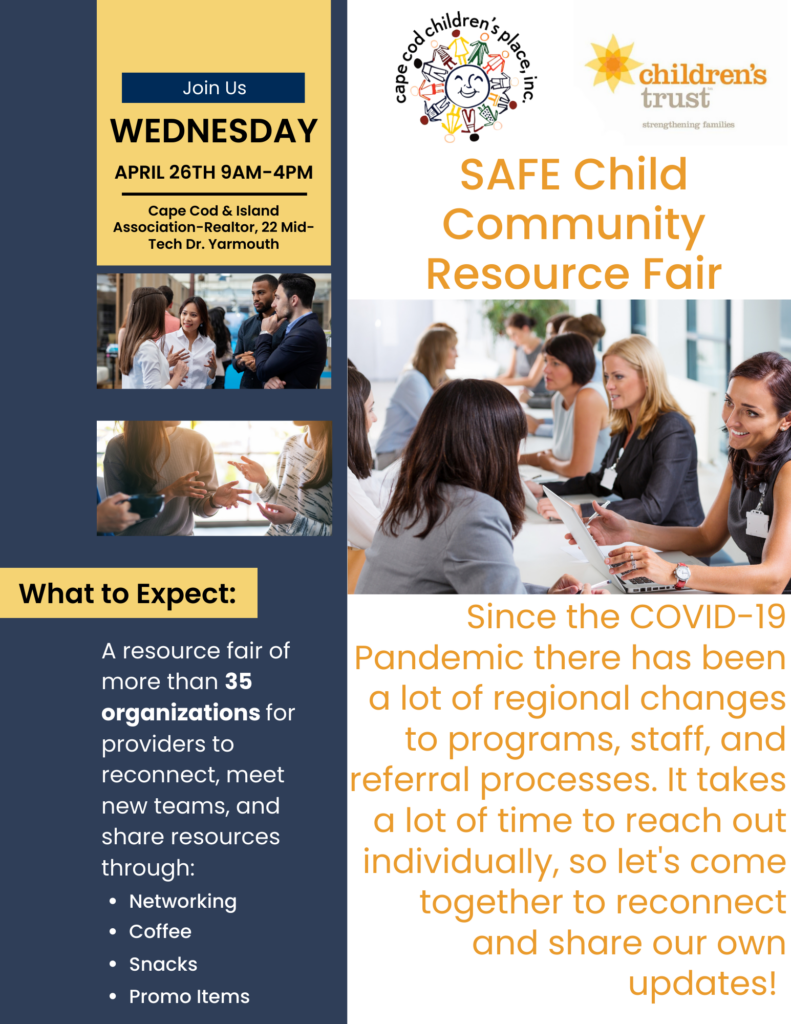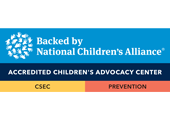SAFE Child Communities: Bringing Protective Factors Home
April 18, 2023
During Child Abuse Prevention Month, it is a critical time to talk about ways to facilitate prevention for families. Given the focus of our work we primarily talk about body safety, online safety, ways to teach children about consent, and those skills parents can teach and pass on to reduce the likelihood of sexual abuse or exploitation. While teaching those skills are paramount, they are not the only ways in which we can work together to prevent child abuse. Our close community partners at Cape Cod Children’s Place a few years ago received a grant from The Children’s Trust, called the SAFE (Stop Abuse For Every) Child Communities. This grant, and the programming funded by it, uses evidenced-based strategies to significantly reduce the risk of child abuse using a community approach.
Using evidence-based frameworks and the brain development of children, this work is focused around developing and increasing the skills and access to families in what is known as the Five Protective Factors. These protective factors include:
- Parental Resilience: having the skills and ability to cope and bounce back from challenges.
- Social Connections: having friends, family, and community to provide emotional support and assistance.
- Concrete support in times of need: such as the knowledge and ability to access life essentials such as food, clothing and housing when there is need.
- Knowledge of parenting and child development: accurate information and skill development in raising children with appropriate expectations and interventions.
- Childrens social and emotional development: teaching and understanding a child’s ability to interact positively with others and communicate their emotions.
It is only through collaboration, communication, and dedication to our children and future that create a community where children are free of abuse…”
The programming and staff at Cape Cod Children’s Place (CCCP) provide education and skill development around these protective factors and incorporates it in all the work they do. More than that, however, there is a critical component around this work, which is helping move community-based agencies in the same direction of prevention.
Since inception of the grant and mission CCCP has worked with Children’s Cove and other community partners to organize agencies who provide services which supports one or more of these protective factors, and over the last year and a half has begun to bring these organizations back together since the onset of Covid-19 separated elements of our community. And this is coming together in a much larger way this month.
On April 26th, the SAFE Child Community of providers is holding a resource fair from 9:00am-4:00pm at the Cape & Islands Association of Realtors Building in Yarmouth. This fair has a dual purpose for the day, the first is to reconnect and reintroduce agencies and those working in them to one another. There has been a lot of change since Covid-19 in providers and its staff and leadership, this fair provides an opportunity for each organization meet one another, network, understand referral processes, and increase access to services for the families they serve. The fair is open to all agencies and their staff and teams to attend for the day.

However, for the second half of the day, from 12pm-4pm the fair will be open directly to the community as well. This way there is dedicated time for agencies and individuals to network in the morning, and then the families each organization serves can learn about the programs available across our community.
It is only through collaboration, communication, and dedication to our children and future that create a community where children are free of abuse, have a voice that is heard, and where they enjoy healthy, safe, and empowered lives.
A special thank you to the SAFE Child Community Resource Fair Committee:
Marly Pereda- Cape Cod Children’s Place
Molly Titus – Cape Cod Family Resource Center
Chris Morin – Independence House
Carla Koehl – Cape Cod Foster Closet
Natalia Frois – Cape Cod Council of Churches
Barbara Dominic – Children’s Behavioral Health Working Group
Jacob Stapledon – Children’s Cove
Ari Branning – Children’s Cove






